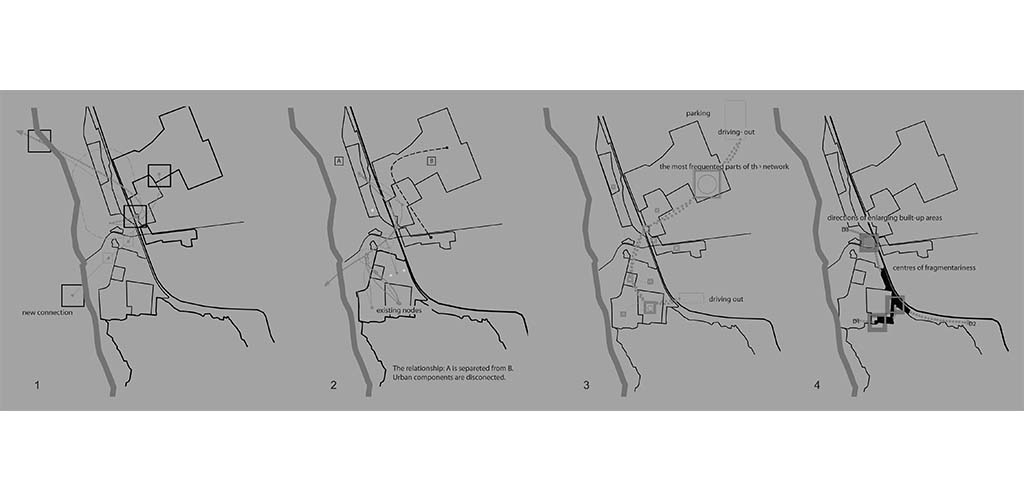Valéria Gašparová home page
Diploma project: Localized Experiments
CONTEXT OF BOUNDARIES
Locality has its own specific context of natural and urban boundaries.its border region. The railway line crossing the locality in two separate areas is also like time division line between the oldest built-up area and the cumulating industrial buildings in the South-East.
VISUALIZATION OF PROCESSES
Orientation to the processes and their connection with existed spatial configuration allow me to understand different movement intensity and specific potention of the place. The perception of chosen urban area and atmosphere of landscape were the motivation for finding positions with a lot of connections and were also associated with the desire to create intensive place.
1. Representation of the network with an existing and with new potential connections.
2. Division of an urban area . This emanates from the concentration of equal activities only in certain areas. Therefore the forms like new generative nodes are arranged to existing spatial configuration.
3. Intensity of the movement in coherence with the most frequented parts of the traffic network.
4. Process of fragmentariness/ enlarging build-up areas.
Ordering of two different elements in two layers according to the principle, where the lower structure enables the movement of the components beyond .
This first form tests simple principle of ordering modifiable components and consecutive deformation of the whole form by shifting. It Is followed by initial experimentation with geometrical operations, which may be partly conductive in solving the issue of form complexity, its oscillative tendency between geometrical manipulation and form re/acting.
OPTICAL BARRIERE
Varying degree of visibility
category 1 0 -10m
category 2 10 -16m
category3 16 – 25m
category4 25- 45m
Attributive visibility – creating an uninsulated environment.
Conditions affecting the process of creating forms results from the concrete situation of the place. Optical barrier is defined as limit, spatial disjunction and also lack of immediate contingency to perceive environment. Consequently, the spatial integration of forms, their structure and their surface are influenced by added value,which is characterized by an open nature of the forms.
Form | thesis |
The site context interposes several requirements in terms of form. Its location in space is connected with the alternating value of place, depending on new potential connections possibly generated by a form. The location of forms is directly related to spatial hierarchy of connections as well as the urban reorganization. Form acquires features on the basis of specific site conditions.
Transference of specific problems to form defines its meaning. Reversion in its perception as re/acting – responsible /form/ and thinking about its acting as well as its dynamics essentially affects the process of form creation. Program of forms must be different: e.g. dynamic associations and materials -light, movement, variable volumes, collective and individual activities. I am interested in conception of form as sequence of some specific spaces for activities ranging in time intervals. In addition I deal with forms alternating in time and their system of deployable components and geometric operations. Combination, comparison, selection and connection are techniques employed in form-creating processes. Multiplicity results from different relations; every connection of certain selected attributes generates an impulsion for new understanding of form. These alternating forms /hypothetical models/ introduce the first phase of form- creating process. They are open for other inputs.
Furthermore, it is important for me to think about consecutive transformation of situations, surpassing spatial limits and operation of forms. I consider the form as capture of some moments, where, by swinging round its structure, the specific light effect is emerging, resulting from its moveable surfaces; I ponder a set of geometrical combinations as spatial metamorphoses.
Form and interference
Diagram as an initial assumption of concrete situation pre-marks the minimal fixation of the form and its spatial orientation. Geometrical manipulation process results in construction of the components with different attributes as well as in the system of adapting one element to another.
Form as combination of variable scales
The problem arises from the fact that in general larger volumes are segregated from the smaller ones. Form is conceived as an attempt to organize variable volumes by means of composition of continual structure including the rule of ordering the volumes; therefore, it is not perceived as a product of an accidental cumulating process.
Form alternating in time
Form is constructed on the principle of two structures consisting of modifiable components with an intention to create authentic space between them. It has different degrees of openness in coherence with its movement.


